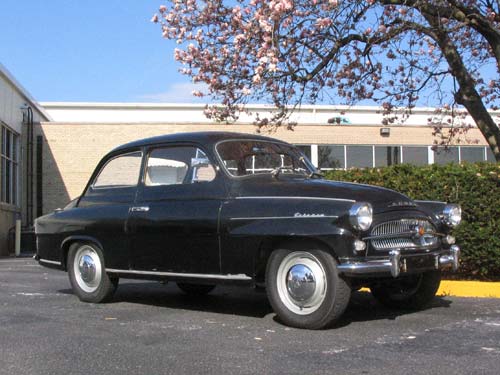
Skoda Octavia-1960
This Skoda Octavia is totally original except for the fluids, battery, and tires. It has a mere 2,384 miles on it. A Czechoslovakian couple moved to Brooklyn and opened...
FREE VEHICLE DEMONSTRATIONS AT 11:00 AM ON SATURDAYS & SUNDAYS.
Please note that the cars or exhibit items shown in this database are part of our collection but may not be on display when you visit.
This Skoda Octavia is totally original except for the fluids, battery, and tires. It has a mere 2,384 miles on it. A Czechoslovakian couple moved to Brooklyn and opened...
Italian composites specialist ATR Group, known for producing the carbon-fiber bodies and chassis of supercars such as the Ferrari Enzo and the Porsche Carrera GT, introduced the SLC (Super...
In 1999 the smart City Coupe was introduced in Europe. This small 2-seater car was designed to be used in heavily-populated urban areas. Smart decided in 2000 to expand...
From the very beginning, the intention of the smart car was to be an electrically-powered urban mobility tool – an environmentally responsible, customizable, and affordable car for two. In...
Smart–designed by the watch maker Swatch and built by Mercedes–is ideal for maneuvering (either driving or parking) in large cities. Smart comes in many models. The “Passion” you see...
Englishman Arthur Wall invented an accessory motorized propulsion wheel for bicycles in 1910. In 1914, the A.O. Smith Company of Milwaukee, Wisconsin, bought the US manufacturing rights to the...
In 1952, disabled Russian veterans of World War II (or the “Great Patriotic War” as it was called in the USSR) received their long-overdue motorized transportation in the form...
The Snyder ST-600-C was produced by the Chinese manufacturer Dezhour Fulu Vehicle Industry Company and imported to the United States by Wildfire Motors Corporation in Steubenville, Ohio, from 1999...
Austrian armaments manufacturer Steyr diversified into automobile production in 1915 and introduced the streamlined 120, the predecessor of this model, in 1935. The six-cylinder, 1385cc side-valve engine was replaced...
The history of Steyr dates back to 1820 with the manufacturing of sporting and military rifles. The concentric circle of the Steyr badge represents a target. The terms of...
The history of Steyr dates back to 1820 and the manufacturing of sporting and military rifles. Hence, the concentric circle of the Steyr badge represents a target. The terms...
The Haflinger was replaced by the larger Pinzgauer. It came in 6×6 or 4×4 forms–which you see here. The ground clearance is 13 inches when loaded. It will carry...
Mort Smit was a Subaru 360 enthusiast that built this special car he called “Peanut”. Mort retired and converted an old Greyhound bus into a motor home to travel...
Hardware store tycoon and automotive entrepreneur Malcolm Bricklin became the first to import Subarus to the US when he founded Subaru America in 1968. Although the brand was popular...
Fuji, one of Japan’s industrial giants, began to make Rabbit motor scooters in 1956. (Be sure to look for one in the motorcycle wing.) Two years later they launched...
The name “Subaru” is Japanese for the Pleiades which are the six stars in the Taurus constellation. The six stars of the Subaru logo represent the six companies which...
In 1966, Subaru introduced Japan’s first kei-class truck, a variation of the second generation Sambar Van. The two passenger truck came equipped with a low truck deck (just under...
As a lieutenant in the Army Air Forces, Texas native Don Surles had an innovative idea. It stemmed from his thoughts on why someone hadn’t designed a more practical...
Michio Suzuki began producing weaving looms for Japan’s then-thriving silk industry in 1909. In an attempt to diversify the company, Suzuki began producing a small motorized bicycle, the 36cc...
In 1952, disabled Russian veterans of World War II (or the “Great Patriotic War” as it was called in the USSR) received their long overdue motorized transportation in the...
The Tatra T11 was the first car made entirely by Tatra in 1923. The T11 was famous for its robust and innovative designs which featured an air-cooled engine and...
In 1925 Tatra decided to enter the famous Targa Florio road race in Italy to help publicize its name. Since Tatra had only been making cars for two years,...
Hans Ledwinka was one of the most original and logical thinkers ever to work in the motor industry. He believed the automobile was destined to become an object of...
Developed with the intent to offer a commercial vehicle with as low cost as possible, Tatra introduced the three-wheeled T49 in 1930. There were two options available: a one-person...
In 1931, Tatra introduced the T57 model, with the air-cooled, four cylinder, overhead valve engine placed in front. The T57 was one of Tatra’s most popular models – four...
In 1931, Tatra introduced the T57 model, with the air-cooled, four cylinder, overhead valve engine placed in the front. The T57 was one of Tatra’s most popular models–four series...
In 1931, Tatra introduced the T57 model, with air-cooled, 4 cylinder, overhead valve engines placed in the front. The T57 was one of Tatra’s most popular models and remained...